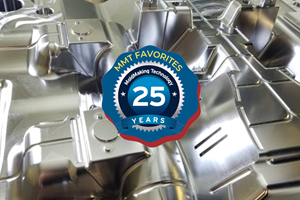7 Things You Need to Know About Nearshore Opportunities
Essential tools and resources to support mold builders in making critical strategic decisions about doing business in Mexico.

Thorough research, strong teams and planning are key to navigating cultural, logistical and regulatory complexities when expanding into other countries. Source | Thinkstock
Conducting business across borders may seem daunting, so understanding all the complexities is important. By doing so, you can analyze appropriately, define a course of action and monitor progress to ensure goals are met. Here are seven considerations for doing business in Mexico:
1. Advisory
- Consider strategic site research covering geography, supply chain, security, human capital, infrastructure, government incentives, utilities, etc.
- Use resources such as the American Chamber of Commerce Mexico, state trade missions, the American Embassy and industry peers.
- Seek assistance from Mexico-specific professionals (advisors, foreign trade, legal, tax and labor).
- Understand that investment requires significant corporate involvement and financial and capital commitment.
- Consider appointing a project manager for your expansion.
2. Human Capital
- Cultural understanding is crucial and can make or break a deal if not managed properly, including the market, salary and benefits.
- Your organization needs to adjust to Mexican standards, not vice versa.
- Securing good talent requires strategic screening and significant training, as well as patience and support to ensure that staff meet industry requirements.
- A local administrative team must handle SAT (Mexico's IRS equivalent), foreign trade and IT requirements.
3. Legal – Corporate
- In Mexico, the year-end date is December 31st.
- It's important to understand the roles and responsibilities of legal representatives and notaries.
- The requirements for corporate books and stock certificates are more bureaucratic compared to the U.S. and Canada.
- Formal agreements and notarization are required for inter-company loans and advances.
4. Foreign Trade
- To import, you must obtain an importer's registry permit. A lease agreement and designated broker are required for the permit.
- To export, it is essential to participate in export promotion programs such as IMMEX – VAT and Excise Certification, PROSEC and the 8th rule. This requires a robust inventory system and careful attention as regulations change quickly.
- You will also need strategies for importing machinery and equipment.
- It is crucial to comply with foreign trade requirements, given the high level of audit collections conducted by the SAT.
5. Labor
- Employment relationships are not "at-will".
- Termination causes are those provided by the Federal Labor Law and the internal work regulations. For example, productivity is not a justified cause for termination.
- Unions with at least 30.0% of eligible employees can request the signing of a collective labor agreement. Multiple unions are allowed.
- Labor and social security rights are not waivable.
6. Tax Issues
- The legal representative must have an active SAT electronic signature (FIEL) and a tax ID number.
- Profit sharing (PTU) is calculated at 10.0% of the taxable income.
- Transfer pricing studies are necessary for intercompany transactions, and the tax authorities closely audit this area.
- The company must fulfill various requirements, including electronic accounting, CFDI receipts (e.g., invoices, payroll, etc.), and monthly, quarterly and annual obligations, regardless of its level of activity.
- Compliance with tax requirements is essential in foreign trade; collections in 2024 have increased by 5.8%.
7. Information Technology
- Care must be taken to ensure that the ERP or software being used complies with SAT and foreign trade requirements. Failure to do so could result in severe penalties, interest and operational disruption.
Related Content
Making Mentoring Work | MMT Chat Part 2
Three of the TK Mold and Engineering team in Romeo, Michigan join me for Part 2 of this MMT Chat on mentorship by sharing how the AMBA’s Meet a Mentor Program works, lessons learned (and applied) and the way your shop can join this effort.
Read MoreDynamic Tool Corporation – Creating the Team to Move Moldmaking Into the Future
For 40+ years, Dynamic Tool Corp. has offered precision tooling, emphasizing education, mentoring and innovation. The company is committed to excellence, integrity, safety and customer service, as well as inspiring growth and quality in manufacturing.
Read MoreMaking Quick and Easy Kaizen Work for Your Shop
Within each person is unlimited creative potential to improve shop operations.
Read MoreLeading Mold Manufacturers Share Best Practices for Improving Efficiency
Precise Tooling Solutions, X-Cell Tool and Mold, M&M Tool and Mold, Ameritech Die & Mold, and Cavalier Tool & Manufacturing, sit down for a fast-paced Q&A focused on strategies for improving efficiencies across their operations.
Read MoreRead Next
PODCAST: Mexico, Mantras and Project Management
This podcast episode was recorded onsite at our first Meximold event in Querétaro Mexico. We sat down with StackTeck’s General Sales Manager for Latin America and talked about the growing manufacturing base in Mexico, its similarities and differences with the U.S., Canada and Europe, and the opportunities and challenges this marketplace presents.
Read MoreMoldmaking Industry's Path Amid Economic Shifts
Entering the second half of 2024, moldmakers navigate challenges and opportunities with plastics industry resilience and potential economic surprises providing hope.
Read MorePODCAST: Meeting Up in Mexico and Talking Shop
Meximold 2019 was an opportunity to sit down with the editor of the event’s publication Plastics Technology Mexico and with the project manager of a Canadian mold builder that opened up a facility in Mexico to capitalize on its moldmaking opportunities.
Read More.jpg;maxWidth=970;quality=90)


















